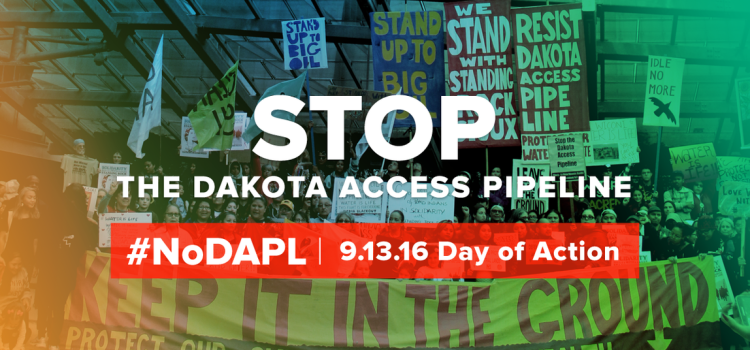
The chapter sent the following letter on the Dakota Access Pipeline to Sens. Heinrich and Udall and Reps. Lujan and Lujan Grisham on September 8, 2016.

Rio Grande Chapter
1807 Second Street, Suite 45
Santa Fe, N.M. 87505
(505) 983-2703
Senator Tom Udall via michelle_kavanaugh@tomudall.senate.gov
Senator Martin Heinrich via zach_aronow@heinrich.senate.gov
Representative Ben R. Lujan via Nicholas.maestas@mail.house.gov
Representative Michelle Lujan Grisham via Elizabeth.reitzel@mail.house.gov
September 8, 2016
Dear Congressional Delegates,
The Rio Grande Chapter of the Sierra Club has 7,500 members in New Mexico and is united in standing with the First Peoples of Standing Rock to demand the immediate stop to the illegal proceedings of the Dakota Access Pipeline.
The 1100-mile four state pipeline has been allowed to start construction without adequate and required government oversight, and is now threatening the water supplies of millions of residents and is crossing thousands of acres of cropland and important Native Peoples’ spiritual, cultural and archaeological sites. Support for the pipeline, according to an August poll of Iowans in the Des Moines Register, has dropped to 38% despite intense media promotion by Dakota Access.
The Army Corps of Engineers granted the Dakota Access pipeline’s permits using a controversial fast-tracking process called “Nationwide Permit 12” that allows the Corps to essentially rubber-stamp pipeline projects on private property or Native American lands with little environmental review and no meaningful public input.
The Corps incorrectly applied this fast-track process in conflict with numerous federal laws and agreements, including the Clean Water Act and the National Environmental Policy Act, the National Historic Preservation Act and the Native American Graves Protection and Repatriation Act, as well as federal trust responsibilities guaranteed in the 1851 and 1868 United States treaties with the Lakota, Dakota and Nakota tribes.
The Corps is on record for not opposing the halt of this controversial project.
For those who have never faced the threat of eminent domain seizure of their private or tribal land, the process is sanctioned in non-specific wording in state statute, especially as regards pipelines, and allows continual corporate “landsman” pressure to get private easements. Private landowners have little protection under law except to hire their own counsel and try to negotiate unenforceable land use agreements with multi-billion corporations.
The costs and risks of pipeline accidents, malfunctions, leaks and damages are the responsibility of the landowner except on the 150’ easement strip that runs through their land. Tribal and rural communities are unable to provide trained first responders in case of the all too frequent accidents, and local banks respond to the increased risk by cancelling farm and home mortgages, dropping homeowner’s insurance and raising loan rates. This is an immense financial burden on Native and rural communities which leaves them poorer and more fragmented after the pipeline is built.
The physical evidence of pipeline failures has been widely documented by the public but the sole federal agency – US National Response Center – tasked with investigating accidents cannot do much more than record the hundreds of pipeline accidents annually.

There is more at stake than the coercive taking of tribal and private land and the unequal power being wielded by large corporate powers and their political allies.
We are deeply disturbed that private corporation security guards and attack dogs have assaulted peaceful and largely Native American demonstrators. This racial violence evokes the shameful past of aggression against Native Americans and the destruction of their lands and culture for corporate profit. This sort of reprehensible behavior is unacceptable today.
Energy Transfer Partners has shown itself to be an outlaw company, using information obtained from a federal court filing on the specific locations of important First Peoples’ sites to target those very places for destruction, before the legal process was allowed to proceed. Corporations with scant regard for the law, the land and the people are breaking the social contract implicit in our federal government granting permits to construct a multi-state pipeline project. ETP should be denied the right to continue.
We respectfully request our congressional delegation, Senators Tom Udall and Martin Heinrich, and Representatives Ben Ray Lujan and Michelle Lujan Grisham, to make immediate inquiries into the situation in order to prevent further injuries and damage to the indigenous sites.
We respectfully urge that our elected officials convey our request that President Barack Obama order an immediate review of the situation in North Dakota as well as the coercive actions of this pipeline company, and to take the strongest possible steps to prevent further injustice.
Respectfully,
David Coss
Chair, Rio Grande Chapter
Act today: #NoDAPL Day of Action – Tuesday Sep. 13 – in Albuquerque and Santa Fe, to create a permanent resolution to the unjust and dangerous pipeline in North Dakota.
Featured image from The Action Network.

You must be logged in to post a comment.